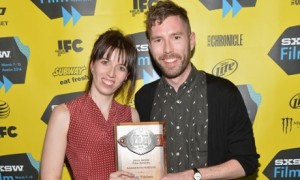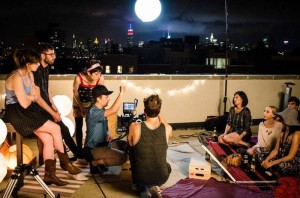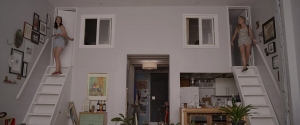Magnet Spotlight: Charles Rogers and Fort Tilden

The South By Southwest Film Festival (SXSW) is an annual film festival that not only premiers feature films, like Bridesmaids back in 2011, but presents new work by indie directors. Each film entered is up to be considered for the Grand Jury Prize, which is a special award given in two categories: Best Narrative and Best Documentary. Think of it as the equivalent to Best Picture for the Oscars. This year, the Magnet's own Charles Rogers (The Music Industry, Prank Phone Calls with Charles Rogers) won the coveted award for Best Narrative Feature for his film Fort Tilden. (Past winners in this category include Lena Dunham for her film Tiny Furniture back in 2010). I (Amanda Ariel Peggy Xeller!) got the awesome opportunity to sit down with the esteemed director, and fellow performer, to talk about the movie and also about him!
Where are you from originally?
Well I grew up in a lot of places, but I grew up mostly on the border of Texas and Mexico at the very bottom. It's called Brownsville, which is a weird, dysfunctional place. And also in Acapulco, Mexico. But I say I'm from Austin, Texas because I went to college there and my family moved there recently.
Where did you go to college?
I went to college at St. Edwards University in Austin. It's a liberal arts school that's fun to be young at.
There was no film major there so I was a Media Communications major but I've always made fun short films. I started a film festival with my good friend Justin Davidson there because there was no film major. That was cool because suddenly everyone liked film. It was called the Sorin Reel Film Festival. I wish I just called it the South Austin Film Festival to. That would have been easier to say.
When you went to school in Austin and you were doing short films, is that when you first got involved or was it before then?
It was before college. My mom had a camera when I was little and I just made all sorts of ridiculous short films with friends and my cousins. And then in high school, any time there was a project, I wanted to make a movie. It became this thing in high school that everybody looked forward to. Some of the subject matter...it was crazy that we weren't expelled for doing these really upsetting films for Religion class. And then in college and undergrad...the nice thing about undergrad is that you could explore anything you wanted to explore and I went through that phase of wondering if film was indeed what I wanted to do because I also liked design and performing. Then I realized that everything I had been exploring is a part of film and in the end film encompasses all my interests. It's a great medium because of that.
What were your first influences in film?
I always go back to the things that made the greatest impression on me when I was little even though now it's drama or not the things I liked when I was little. My parents had a really good sense of humor and loved comedy. They showed me a lot of comedy. I grew up on Mel Brooks and the Marx Brothers and the Pink Panther films...a lot of broader, more classic comedies. I'm glad I saw them at that age. That kind of comedy has a lot of value but I think this generation has a harder time seeing the value in them because it's hard to overlook some of the other elements that are considered campier and frivolous. I keep wanting to bring what I love about that type of comedy into a more modern approach.
What made you want to come to New York?
The money. I had always wanted to go to NYU and I knew that that was what I wanted to do as soon as I left undergrad - to study film. I had always envisioned a future where I was a part of the comedy world of New York. And I was just tempted by a world of jazz and liquor and just drawn in.
What attracted you to the Magnet?
My friend Jarreau Carrillo took a Level 1 before I did and I heard from a few people that it was a really cool place. I didn't know anything about the improv world necessarily and the Magnet sounded like a really good place to start and then I realized that I really liked it and wanted to stay. I started doing improv almost 3 years ago last month.
You're a film maker and an improviser. How has what you've learned from improv tie into your film?
I really feel like doing improv has made me a better filmmaker and writing films has made me a better improviser. The biggest take-away is how comedic tension is the same as dramatic tension. So much of game or just the dynamic between two people in an improv scene has to do with the give and take of that tension and the building of it. That principle is exactly the same in writing scenes. In improv, your characters have to be very tight and you have to make the reactions very strong otherwise it's hard to build a scene on top of it. In film, people tend to get away with not exploring that too much because there are other elements at play. I think that has helped me become a better writer because you want those elements to be as strong as they can because those are the tent poles for your scenes and your story. It also has just helped me. I think improv is a lot like therapy. There is something about performing that is so imminent that you can feel when something's not working because you are in front of a stage of people as it's happening. So if you're not being honest in your character or performance, you know it. You can feel it. Unless you are a delusional person. But when you're writing, because you are kind of in a vacuum, it is easier to mislead yourself of when you are being truthful or not. In that way, improv is great because it helps you define your own instincts. Once you feel like you've cultivated them more it becomes easier to write alone because you know yourself more.

For those who have not seen Fort Tilden, what is it about?
Fort Tilden is a comedy about Allie and Harper, who are best friends headed to the beach for the day. It's sort of a comedy of errors of the obstacles in their way and all the mistakes they make along their journey.
This was co-written and co-directed with Sarah-Violet Bliss. How did you two meet?
We met in NYU Grad Film. We are in the same year. We've been good friends since we started in 2009. This was our first collaboration. This was the first thing we worked on together. She makes comedies too and we have different voices and sensibilities but we found a way to really sync up in making this film.
What's your relationship with her and what's its importance with taking on a project like this? How do you balance each other?
We co-wrote and co-directed so we had to be a unit. We both carried a vision of the film in our own heads that was at once our own but also shared so it's weirdly like having a baby with someone especially because it was a 9 month process from concept to festival. What was great was that if there ever were any disagreements on set or in the writing process, they were usually not great disagreements because we both shared that same vision for the film. If there were disagreements, they were in the name of making the film and not out of selfishness or taste or because we favored something on a personal level more. That balance was actually very improvisational. On set, one of us would yell "Action!" or "Cut!" and in between takes we would go up to the actors and both start having a quick conversation about it. There was no division of labors or responsibilities. We had to find that balance in the moment. We had to make the movie so quickly that there was no way to examine the approach. It was always found in the moment.
Where did the story of Fort Tilden come from?
At the end of May, we were just kicking around ideas for a web series with our soon-to-be-director of photography Brian Lannin and we had one idea for one episode that could be about two girls just trying to get to the beach. We got really excited about the comic potential of that simple premise. And by the end of the hour brainstorming we were like, "We should just make this. We have to make this film! We watch other people make feature films all around us. We are at the place now where we want this happen. We should jump on it." We decided to make it by the end of the summer. So we wrote and pre-produced for 6 weeks. We shot for 3 weeks. It's been a 9 month total process from concept to festival. I still haven't caught up with the reality of it all. And in the writing process, even though the concept was so simple, with the writing process you begin to discover what it's really about. We ended up filling the story with ourselves and our friends and issues that we're surrounded by.

How is that you chose this subject matter to write about?
All of the issues in the film presented themselves in the writing process because we really did start with something very simple and because going out to Fort Tilden is this Williamsburg rite of passage and getting anywhere in New York is comically simple and difficult at the same time. When we were building the characters we expanded the things we found interesting about them. Our favorite characters from film of a similar tradition, are very much their own characters. We wanted to find characters to represent the more recognizable issues of a certain demographic today but at the same time we really wanted them to have their own voices. In that way, their voices took a life of their own as we were writing. That's a combination of Sarah-Violet's voice and my voice and also channeling all the references that we wanted to build the movie on.
After you wrote the film and you cast Bridey Elliott and Claire McNulty, did you have their voices in mind or did the movie change severely with the addition of their voices?
We started off not knowing who would play the roles. Claire McNulty is an old friend of Sarah-Violet's and she's cast her in her shorts and I've really loved her in her movies. We staring writing Allie for Claire's voice and it became really helpful in knowing how the girls were different because we started of knowing how they were similar. We found the ways that they were opposites. know how they are similar. Bridey, she's on a Maude team at UCB and she does stand-up. We knew of her but we didn't know her. She's so weird and charming. The role of Harper could be very unwatchable if it's miscast. We were so lucky to have both of these girls because they have a real natural charisma. It's so important when writing characters who make bad choices and say mean spirited things because you have to be on the journey with them.
This film is a lot of things. It's a comedy, a drama, a character exploration, and also comments on maturity and responsibility. You poke fun at your own demographic. What are you hoping for audiences to take away when they see Fort Tilden?
That's a good question. It is a satire. So in that regard there's a lot of references. Some of the comedy comes from cultural observations made throughout the film. I hope that you enjoy that but it is also about these two very specific characters and their issues and coming to terms with those issues or the beginning of a realization that they should come to terms with certain things about themselves. There are specific things about this generation that we try to capture besides the quarter life crisis and privilege. Setting the film in Williamsburg and going through all these different neighborhoods in Brooklyn was one way to explore the side of privilege that is hypocritical and naive. The girls consider themselves to be very worldly. Allie is going to the Peace Corps to Liberia, or so she thinks, but just going through deep Brooklyn, as they say, proves to be a very uncomfortable experience. You begin to see where the boundaries of their understanding are. So I hope that there's a lot within the characters that you can take away. It's interesting, some people who watch the film find the characters unlikeable. That's something that we were not exactly anticipating. But I'm not afraid of that reaction either because I think that if people find the film uncomfortable, then they're uncomfortable with their own relationship to elements of the subject matter. If you are not laughing, I'd rather you be thinking.

Who will we recognize from the movie who's also a part of the comedy community?
SO MANY PEOPLE! One of the coolest things about this whole experience is being able to work with so many comedians and actors who I am friends with or wanted to know more about. Sarah-Violet knows a lot of actors and comedians too. So from the Magnet you'll recognize Desiree Nash, Phoebe Tyers, her twin Claire who is often in the audience, Shacottha Fields, Sarah Burkhalter, Jarreau Carrillo, and Dovid Schwartz. Also, Rebecca Robles did the hair and the make-up for the film and Matt J. Weir worked on the crew. Outside the Magnet, there are UCB improvisers like Neil Casey and a lot of people on Maude teams. And from the P.I.T. there's Becky Yamamoto. So there's a lot of roles in the film and the three main theaters are well represented in the movie. And Reggie Watts. It's great being an improviser and a filmmaker because I see people who make comedy films not able to navigate the world of casting. Having such a direct relationship with the comedy world is so awesome because you get to see and know on a personal level so many people and so much talent in a more intimate way than if I was just a filmmaker. It's better than going to improv show and trying to cast something blindly. It's great to perform with the people that I'm working with and get to know their strengths intimately.
Now that it's finished, is there anything in retrospect that you would have changed about it?
No. I am really grateful for the way everything worked out. 9 months ago, we had no idea we were making a movie. In that regard, I believe everything really happens for a reason. And I still can't believe we premiered at the place we wanted and won the award. I will say, the next film I make, I want the experience to be a more conventional process of writing and production. It's hard to make a movie so quickly. If you do make it so quickly you have to do it in a certain way and hope that there's a certain amount of universal energy on your side, which I think is this case. But I wouldn't necessarily want to replicate that.
What are some past films you have taken on?
I've made shorts before this. I made a web series for Subway called Subway Sandwiches called TechUp, which was very silly. My short Oysters Rockefeller is online. It went to a few festivals. I have another short called Autumn Whispers, which is at festivals now. Most of the films I've made are similar in a dark almost farcical style. In collaborating with Sarah-Violet was a chance to explore an aspect of my voice that otherwise I wouldn't bring out in that particular way. Fort Tilden is really the most realistic film I've made. It reflects real life more than any other film I've made.
What's on the horizon for you with film?
Fort Tilden will go to more festivals and hopefully find distribution. That's the thing I'm facing the most right now. Past that, I have an idea for a future film that I really want to make and Sarah-Violet and I have an idea for a TV show that we are going to start pitching. I'm hoping I can ride this wave into the next project and hope that things will get easier to get things off the ground from now on.
Is there a place we can go to check out your work?
You can go to charlesrogersfilms.com where I describe all my work using words and pictures.
Do you have anything else you'd like to say?
I have that prank call show! Come to it!
You can see Charles performing with The Music Industry as a part of Megawatt every Wednesday night, or see him in "Prank Phone Calls" Monday, April 21st at 8:30pm.


